
Including All Learners
EdTA believes that all students, regardless of developmental differences, have the right to a sequential, standards based, theatre education with high expectations for their achievements. We further believe inclusion means providing appropriate accommodations so that they may participate in theatre and grow as theatre art makers and creators. We are committed to supporting theatre educators by providing strategies, models and examples so that they may better support their students. You will find some of those resources on this page. Stop back often as we add to our library of resources.
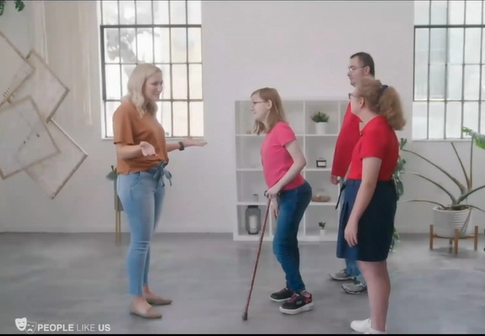
An Inclusive Teaching Model
Educators affiliated with the inclusive theatre learning group, People Like Us, helped bring to life inclusion by teaching three of EdTA's "Click to Teach" interactive units in their special education classrooms, and noting strategies any teacher could use. In this model unit, Educators Carley Granick & Stacy Santiago of the North Florida School of Special Education offer an example of simple to use inclusive practices for students with special needs, based on our popular "Click To Teach" unit Defining Given Circumstances with an Open Scene. The teachers modified and taught this unit in their Middle Grades Classroom. You may wish to open the Click to Teach unit in another window to follow along with this modified inclusive version.
EdTA Click to Teach Modifications
Defining Given Circumstances with an Open Scene
Teacher: Carley Granick, Teacher Assistant: Kylie Hurst
Intermediate Students, North Florida School of Special Education (Self-Contained)
April 2023
Warm-Up
Each student had the choice to stand at the front of the class or stand at their chair and “tell me something good.” Giving the choice to stand at the front of the class or stand at their chair helped give the student the option on “how” they will participate and not “if” they will participate. My “tell me something good” warm-up gives students the chance to share as much as they’d like as long as it’s positive. The student can share as much as they’d like to help build up their confidence when it comes to the lesson.
We then moved into an emotions exercise. The actor would come up, pick an emotion off of an emotion choice board, and show us what that looks like. The rest of the students would then get to guess what emotion the actor chose. Every student participated willingly and some even went twice! There was one student with limited vocabulary so instead of raising his hand to guess the emotion, I presented him with the emotion choice board and he chose and answered with that.
Step 1: Get Inspired
We watched the lesson video from Defining Given Circumstances with an Open Scene together. After watching the two examples, students shared if they liked the comedic or dramatic portrayal more. We discussed what dramatic and comedic acting are.
Step 2: Explore the Script
Due to reading skills, I edited the script before class:
A: What are you doing?
B: Nothing.
A: What?
B: Huh?
A: What?
B: Oh well.
The shorter edit gave us more time to work on the script and skill. Students partnered up and each pair read through the script. Then, they switched roles. Once students were comfortable with the lines, I had them choose the emotion they would focus on throughout the rest of their reading. If I had students who weren’t reading, I would have taken away all lines and had them pantomime with emotion and gestures. For example:
A: *waves*
B: *looks around*
A: *smile*
B: *frown*
A: *shrugs shoulders*
B: *walks away*
Step 3: Define Your Given Circumstances
Rather than dive into given circumstances, I had students pick their emotion. Their options were happy, sad, angry, and then one student suggested tired, which I loved so we rolled with that! We focused on one of the listed questions: What kinds of gesture, body movement and facial expression will you use to develop your character?
Step 4: Rehearsal
We continued rehearsing in our pairs and students would perform their script for each other. I suggest having choice boards and fidgets on hand throughout the class. I also suggest having the lines (A or B) highlighted for each student to know which character they are playing and to follow along with. To extend learning, students can memorize their scripts.
Step 5: Perform and Record
Step 6: Measure Learning
The original rubric was modified to more appropriately measure student learning. Variations on the rubric allow accommodations for all types of learner abilities.
Original Rubric
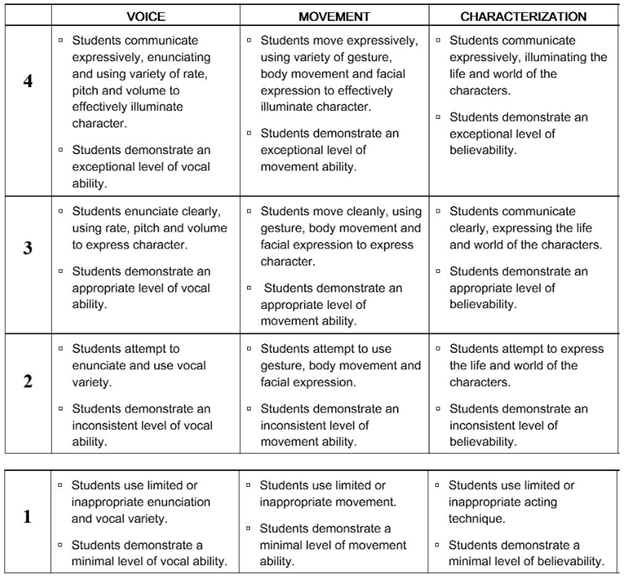
Alternative Rubrics and Additional Evaluation Ideas
1. Use a checklist: Instead of a rubric, use a checklist that outlines the different skills or behaviors you are looking for in each category. This can be easier for some students to understand, as they can simply check off each item as they demonstrate it.
2. Use peer evaluation: In addition to teacher evaluation, incorporate peer evaluation into the assessment process. This can help students learn from each other and provide more opportunities for social interaction and collaboration. Ensure suggestions are specific.
3. Focus on process rather than product: Instead of focusing solely on the final performance, assess the process that students go through to develop the skill. For example, assess participation, willingness to take risks and try something new, and their ability to give and receive feedback.
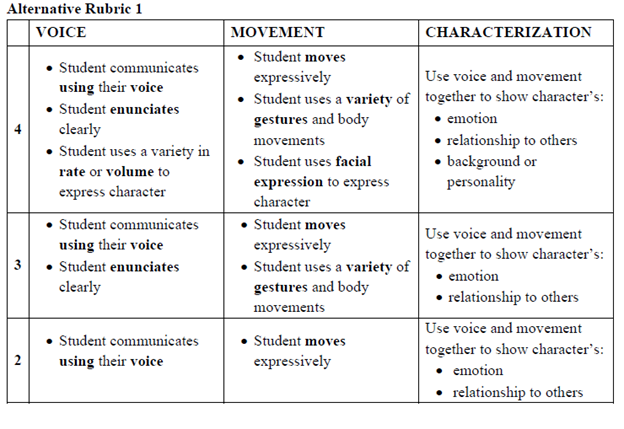
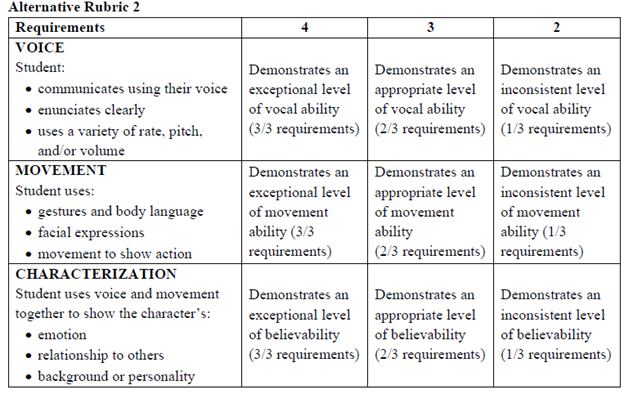
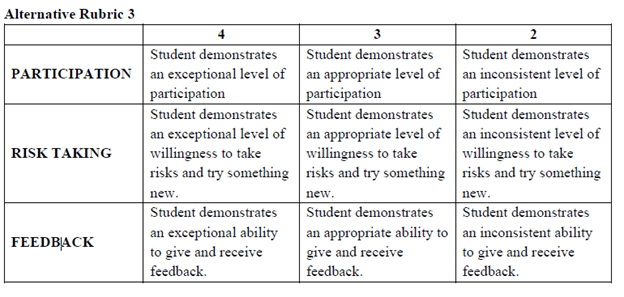
Suggested Inclusion Strategies by Grade Level
EdTA gratefully acknowledges the invaluable help of the educators involved in this project and the students in their classrooms:
Elementary Click to Teach Unit: Let's Show A Story - Teacher: Carley Granick & Stacy Santiago, North Florida School of Special Education (Jacksonville, FL)
Middle Grade Click to Teach Unit: Defining Given Circumstances with an Open Scene - Carley Granick & Stacy Santiago, North Florida School of Special Education (Jacksonville, FL)
High School Click to Teach Unit: Preparing a Role - Shira Schwartz, Basha High School (Chandler, AZ)
-
Elementary Click to Teach - Inclusion StrategiesYou must log in to access content.
Suggestions and strategies for including all learners for the Elementary level EdTA Click to Teach lesson - "Let's Show a Story."
-
Middle Grades Click to Teach - Inclusion StrategiesYou must log in to access content.
Suggestions and strategies for including all learners for the Middle Grades level EdTA Click to Teach lesson - "Defining Given Circumstances with an Open Scene."
-
High School Click to Teach - Inclusion StrategiesYou must log in to access content.
Suggestions and strategies for including all learners for the High School level EdTA Click to Teach lesson - "Preparing a Role."
Inclusion Strategies and Model Cornerstone Assessments
A Model Cornerstone Assessment (MCA) is a model assessment with guidance for instruction in your classroom. The authors of the National Theatre standards created Model Cornerstone Assessments aligned to the standards for grades Pre K-8, and at three levels in high school - proficient, accomplished, and advanced, which are housed both here on the Learning Center and on the National Standards website. During the writing of the National Theatre Arts Standards, a team from EdTA worked with specialists from the Kennedy Center Very Special Arts team to write specific inclusion strategies that matched the Theatre Model Cornerstone Assessments. The chart below offers a quick reference to both the Model Cornerstone Assessment and the matching inclusion strategies.
| Model Cornerstone Assessment | Inclusion Strategies |
|
|
| ||
|
| ||
|
| ||
|
| ||
|
| ||
Helpful Webinars
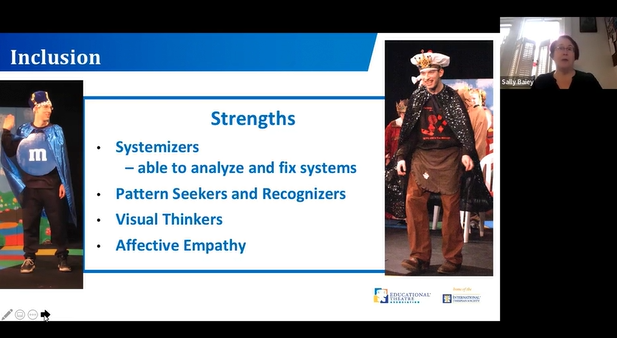
-
Contains 7 Component(s), Includes Certificate Recorded On: 05/28/2024
Discover tips, tools, and strategies to make theatre education more inclusive for learners with diverse needs in this three part webinar series "Teach with GIVE" from TeachwithGIVE.org.
-
Register
- Non-member - $49
- Thespian Troupe Director - Free!
- Junior Thespian Troupe Director - Free!
- Thespian - Free!
- Professional Member - Free!
- EDTA Staff - Free!
- More Information
-
Register
-
Contains 3 Component(s), Includes Certificate Recorded On: 05/07/2024
Students active in a neuro inclusive school and theatre program discuss the root of the issue of neurodiversity and offer some solutions for increasing the accessibility and inclusion.
-
Register
- Non-member - Free!
- Thespian Troupe Director - Free!
- Junior Thespian Troupe Director - Free!
- Thespian - Free!
- Professional Member - Free!
- EDTA Staff - Free!
- More Information
-
Register
-
Contains 3 Component(s), Includes Certificate Recorded On: 08/17/2022
Everyone deserves access to quality education. But if you’re like most educators, you may feel ill-equipped to offer meaningful curriculum to your students with disabilities. By the end of this webinar, you’ll gain three researched-based teaching strategies, three activities and four resources you can use to create more inclusive, more effective learning environments for students with developmental differences.
-
Register
- Non-member - $49
- Thespian Troupe Director - Free!
- Junior Thespian Troupe Director - Free!
- Thespian - Free!
- Professional Member - Free!
- EDTA Staff - Free!
- More Information
-
Register
-
Contains 3 Component(s), Includes Certificate Recorded On: 05/10/2022
This training will help drama teachers identify what areas their actors on the spectrum need support with, along with ideas of how to appropriately offer that support. In addition, we will explore how to build an inclusive acting ensemble where everyone is valued and appreciated for their creativity and unique contributions.
-
Register
- Non-member - $49
- Thespian Troupe Director - Free!
- Junior Thespian Troupe Director - Free!
- Thespian - Free!
- Professional Member - Free!
- EDTA Staff - Free!
- More Information
-
Register
-
Contains 3 Component(s), Includes Certificate Recorded On: 07/19/2021
Strategies, resources, and techniques for welcoming and supporting the neurodiverse learner in the classroom and on the stage.
-
Register
- Non-member - $49
- Thespian Troupe Director - Free!
- Junior Thespian Troupe Director - Free!
- Thespian - Free!
- Professional Member - Free!
- EDTA Staff - Free!
- More Information
-
Register
Additional Lesson Plans
Check out these lesson plans from the EdTA Lesson Plan Library - available to EdTA members!
-
Creating a Tableau for a StoryYou must log in to access content.
This lesson by Cathy Archer is designed for a unified theatre class which is a combination of students with special needs and mentor students in grades 9-12, or a 6th grade class. In this lesson, students will create a tableau for a chosen story and briefly bring it to life. The emphasis is on creating a moment in the story when the characters are “feeling” a specific emotion in response to an event or interaction with another character.
-
Creating a story using sounds heard in the classroomYou must log in to access content.
This lesson by Cathy Archer is designed for a unified theatre class which is a combination of students with special needs and mentor students in grades 9-12, or a 6th grade class. In this lesson, students develop their listening and imagination skills and explore how sounds can enhance a story.
-
Developing Skills in Working CollaborativelyYou must log in to access content.
This lesson by Cathy Archer is designed for a unified theatre class which is a combination of students with special needs and mentor students in grades 9-12, or a middle school class. In this lesson, students participate in several group building activities which culminate in a shared created story.
Become a Member for More
FOR FULL ACCESS TO CURRICULUM, LESSON PLANS AND MORE - JOIN EDTA and enjoy full membership benefits.
| Access Date | Quiz Result | Score | Actions |
|---|
Learning Center
- Webinars
- Adjudication Trainings
- Featured Courses
- Full Course List
- Lesson Plan Library
- Click to Teach Interactive Online Lessons
- Resources for New Theatre Teachers
- Technical Theatre Educator's Manual
- Connected Arts Networks
- Diverse Resources for Theatre Education
- Behind the Scenes Technical Theatre Curriculum
- Social & Emotional Learning
- Additional Standards Based Instructional Resources
- Search the Catalog
- Cart (0 items)
Full Site Search
Membership Benefits
Join EdTA for full access to our professional development and standards-based teaching resources, including:
- 300+ lesson plans
- Click to Teach online lessons
- K-12 curriculum
- Webinars
- And more!



